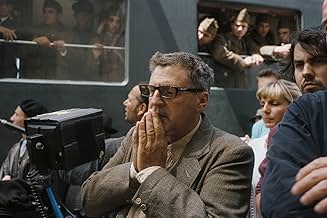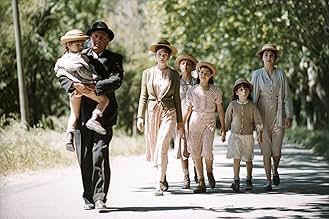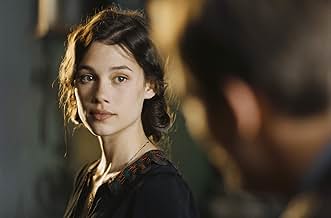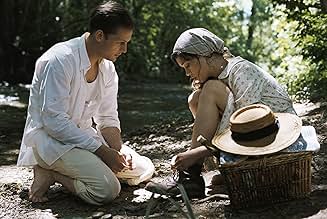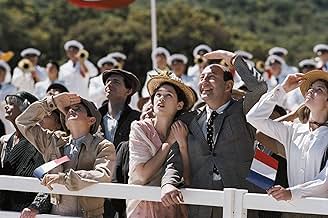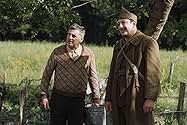AVALIAÇÃO DA IMDb
7,0/10
4,4 mil
SUA AVALIAÇÃO
No sul da França na década de 1930, um pai fica dividido entre seu senso de honra e seu profundo amor por sua filha quando ela tem problemas com o filho de um rico comerciante.No sul da França na década de 1930, um pai fica dividido entre seu senso de honra e seu profundo amor por sua filha quando ela tem problemas com o filho de um rico comerciante.No sul da França na década de 1930, um pai fica dividido entre seu senso de honra e seu profundo amor por sua filha quando ela tem problemas com o filho de um rico comerciante.
- Direção
- Roteiristas
- Artistas
- Prêmios
- 2 vitórias no total
- Direção
- Roteiristas
- Elenco e equipe completos
- Produção, bilheteria e muito mais no IMDbPro
Avaliações em destaque
Marcel Pagnol was a wonderful French writer, director and playwright. His stories are indeed classics and have been filmed, re-filmed and even re-filmed again. So, it's not at all surprising that Daniel Auteuil has decided to take a stab at Pagnol's classic stories--not just starring in them but writing the new screenplays and directing them. I say that's not surprising because not only are these wonderful stories, but Auteuil also has previously been in a couple other Pagnol stories--"Jean de Florette" and "Manon Des Sources". His four new films consist of this film, "The Well-Digger's Daughter" as well as the wonderful trilogy consisting of "Marius", "Fanny" and "Cesar"--which just recently debuted and which are not yet available here in the States. I cannot wait to see these three most recent movies.
"The Well-Digger's Daughter" is a story with many similarities to the Fanny Trilogy Auteuil made following this film. All are set in Provence, concern ordinary folks and are about the complications that arise from an unplanned pregnancy.
The story begins with the daughter, Patricia (Astrid Bergès-Frisbey) meeting a handsome young man, Jacques (Nicolas Duvauchelle) when she's on her way to bring her father, Pascal (Daniel Auteuil), his lunch. The audience KNOWS based on their meeting that the two are destined to be a number. However, there are some complications---such as Felipe (Kad Merad) wanting to marry Patricia. But, of course, much more serious complications arise--and I don't really want to get to them here--just see the film.
I love films about ordinary people--and Pagnol's are about as ordinary as you can find! Some may not be quite so captivated by these folks-- they aren't exactly rich, cultured or the Hollywood types. But, I am pretty ordinary as are 99% of movie viewers! So why not enjoy the lives and loves of folks we can relate to?! Plus, the story is so nicely written, lovingly directed and enjoyable that I strongly recommend you give it a try.
By the way, Pascal's grandson, who he treats as if it's HIS kid is actually Zachary Auteuil--the actor/director's real life son!
"The Well-Digger's Daughter" is a story with many similarities to the Fanny Trilogy Auteuil made following this film. All are set in Provence, concern ordinary folks and are about the complications that arise from an unplanned pregnancy.
The story begins with the daughter, Patricia (Astrid Bergès-Frisbey) meeting a handsome young man, Jacques (Nicolas Duvauchelle) when she's on her way to bring her father, Pascal (Daniel Auteuil), his lunch. The audience KNOWS based on their meeting that the two are destined to be a number. However, there are some complications---such as Felipe (Kad Merad) wanting to marry Patricia. But, of course, much more serious complications arise--and I don't really want to get to them here--just see the film.
I love films about ordinary people--and Pagnol's are about as ordinary as you can find! Some may not be quite so captivated by these folks-- they aren't exactly rich, cultured or the Hollywood types. But, I am pretty ordinary as are 99% of movie viewers! So why not enjoy the lives and loves of folks we can relate to?! Plus, the story is so nicely written, lovingly directed and enjoyable that I strongly recommend you give it a try.
By the way, Pascal's grandson, who he treats as if it's HIS kid is actually Zachary Auteuil--the actor/director's real life son!
The Well-Digger's Daughter is a french movie, remake of another famous french film of the 40's.
If you don't know anything about french cinema, know that this remake features well known comedians such as Daniel Auteuil (it's also his first work as a director), Kad Merad, Nicolas Duvauchelle, Jean-Pierre Darroussin, Sabine Azema, and Marie-Anne Chazel.
The original film was directed, written and produced by Marcel Pagnol, famous not only for his films but also for plays and novels that have become classics.
The remake definitely honors the classic, and I can't find one single thing to criticize. The actors all deliver moving and natural compositions, from the loving and torn father (Auteuil) to the moody Mrs Mazel (Azema), from the benevolent Felipe (Merad) to the seductive Jacques (Duvauchelle). By the way, it certainly isn't hard to see why the heroine falls for him after just one encounter ;) The main character, Patricia, is played with tact and sweetness by Astrid Bergès-Frisbey, who somehow reminds me of Jane March. She was unknown before this role (even if it's not her first), but no doubt this is the year of her breakthrough, as she will soon be seen interpreting a mermaid in the next Pirates of the Caribbean.
The direction is precise, careful, and manages to capture each small emotion of the characters. It really serves well the beautiful and moving plot. You're completely immersed into the story and can have your eyes wet more than once, even though the movie isn't a melodrama nor a tragedy. This story is timeless, and universal. I would recommend it to absolutely everyone. It's a 5-star film!
If you don't know anything about french cinema, know that this remake features well known comedians such as Daniel Auteuil (it's also his first work as a director), Kad Merad, Nicolas Duvauchelle, Jean-Pierre Darroussin, Sabine Azema, and Marie-Anne Chazel.
The original film was directed, written and produced by Marcel Pagnol, famous not only for his films but also for plays and novels that have become classics.
The remake definitely honors the classic, and I can't find one single thing to criticize. The actors all deliver moving and natural compositions, from the loving and torn father (Auteuil) to the moody Mrs Mazel (Azema), from the benevolent Felipe (Merad) to the seductive Jacques (Duvauchelle). By the way, it certainly isn't hard to see why the heroine falls for him after just one encounter ;) The main character, Patricia, is played with tact and sweetness by Astrid Bergès-Frisbey, who somehow reminds me of Jane March. She was unknown before this role (even if it's not her first), but no doubt this is the year of her breakthrough, as she will soon be seen interpreting a mermaid in the next Pirates of the Caribbean.
The direction is precise, careful, and manages to capture each small emotion of the characters. It really serves well the beautiful and moving plot. You're completely immersed into the story and can have your eyes wet more than once, even though the movie isn't a melodrama nor a tragedy. This story is timeless, and universal. I would recommend it to absolutely everyone. It's a 5-star film!
Remaking a Pagnol film is asking for trouble. Film snobs will dismiss the remake without giving it a chance, though 60 years ago those same film snobs probably dismissed Pagnol as a film director, finding him hopelessly inferior to Renoir or ... Afficionados of Raimu, an unquestionably great actor - when he had a good role - will say that no one can do what he did. And they would be right; no one can out-Raimu Raimu. A force of nature, because Raimu at his best was a force of nature, cannot be imitated or equaled. But a role can be done a different way, even if the words are the same, just as different great actors can succeed at Hamlet or King Lear. And yes, I speak of Shakespeare. Theater/literature snobs can guffaw, but who cares? Let them go about their business.
And I will go about mine, which is to talk about this movie, which is remarkably moving. Moving in part because Pagnol's script was a masterpiece, yes, but also because this is a very well-done realization of it.
The first thing that struck me about this movie was the color, when you see the scenery. Pagnol, for whatever reason, really didn't do a lot with scenery in his black and white movies. This movie shows what that deprived us of. It is done in the best tradition of the color versions of Jean de Florette, Manon des sources, La gloire de mon père, and Le château de ma mère. The countryside around Salon de Provence comes alive, and is beautiful.
I was also struck by the use of music, which again is not a high point in Pagnol's version. The Italian song, so wonderfully recorded by Caruso, is used in very moving ways here. Auteuil has a better sense of how to use music in a film than Pagnol did, at least with this script.
But the heart of this movie is Pagnol's text, and this cast, a great one, does it beautifully. True, at times, as I marveled at the genius of Pagnol's text, I wondered if that meant these actors were acting it, rather than becoming the characters. That may be true in some cases, though not for Kad Merad, who becomes Philippet every bit as much as Fernandel did. I can hear Raimu reciting the lines Daniel Auteuil speaks, and beautifully, perhaps because they are so different, certainly because Raimu delivered them in a way that engraved them in my memory. But Auteuil makes them very moving as well. He is not a force of nature as Raimu was, but his Pascal is also a real character.
What I realized, over and over again watching this movie, is that the script was indeed written by a playwright, and Auteuil respects that. We still have fully-developed scenes, as movies used to have when they were still imitating theater. And, as a result, with this great script and these great actors, we have deeply moving moments, such as when Pascal says goodbye to his daughter, sending her off to raise her bastard child elsewhere. Or, even more deeply moving, when the parents of the father of her child, having just lost their son in the war, come to see the child, the last remnant of their now lost son. Every line of that scene is deeply moving: Pascal's pride in his grandson, the parents' grief and longing for their son. (I didn't care for the mother's final admission that she burned her son's letter rather than deliver it to Patricia; that was better done in the previous version.)
A film script is like a play: it can be done in more than one way, if it's worth doing - as this script most certainly is. It will not wipe away memories of Pagnol's 1940s version, nor should it. You don't have to forget Olivier's Hamlet to love Jacobi's, or Branaugh's, or ... I suspect the very film snobs who dismiss Pagnol's own work will cause this film not to enjoy the success it deserves, but that would be a real crime. This is, in fact, a wonderful realization of Pagnol's very beautiful, very wonderful script.
---------------------------------
I watched this movie again this evening, and really have nothing to add to what I wrote before, other than to say that it is a beautiful realization of Pagnol's script. Auteuil, Merad, and Darroussin are three of modern French film's finest actors, and they all give first-rate performances here. The often wonderful dialogue is delivered as in a great movie or play, lovingly and beautifully. Watch this. It's a deeply moving and wonderful movie.
And I will go about mine, which is to talk about this movie, which is remarkably moving. Moving in part because Pagnol's script was a masterpiece, yes, but also because this is a very well-done realization of it.
The first thing that struck me about this movie was the color, when you see the scenery. Pagnol, for whatever reason, really didn't do a lot with scenery in his black and white movies. This movie shows what that deprived us of. It is done in the best tradition of the color versions of Jean de Florette, Manon des sources, La gloire de mon père, and Le château de ma mère. The countryside around Salon de Provence comes alive, and is beautiful.
I was also struck by the use of music, which again is not a high point in Pagnol's version. The Italian song, so wonderfully recorded by Caruso, is used in very moving ways here. Auteuil has a better sense of how to use music in a film than Pagnol did, at least with this script.
But the heart of this movie is Pagnol's text, and this cast, a great one, does it beautifully. True, at times, as I marveled at the genius of Pagnol's text, I wondered if that meant these actors were acting it, rather than becoming the characters. That may be true in some cases, though not for Kad Merad, who becomes Philippet every bit as much as Fernandel did. I can hear Raimu reciting the lines Daniel Auteuil speaks, and beautifully, perhaps because they are so different, certainly because Raimu delivered them in a way that engraved them in my memory. But Auteuil makes them very moving as well. He is not a force of nature as Raimu was, but his Pascal is also a real character.
What I realized, over and over again watching this movie, is that the script was indeed written by a playwright, and Auteuil respects that. We still have fully-developed scenes, as movies used to have when they were still imitating theater. And, as a result, with this great script and these great actors, we have deeply moving moments, such as when Pascal says goodbye to his daughter, sending her off to raise her bastard child elsewhere. Or, even more deeply moving, when the parents of the father of her child, having just lost their son in the war, come to see the child, the last remnant of their now lost son. Every line of that scene is deeply moving: Pascal's pride in his grandson, the parents' grief and longing for their son. (I didn't care for the mother's final admission that she burned her son's letter rather than deliver it to Patricia; that was better done in the previous version.)
A film script is like a play: it can be done in more than one way, if it's worth doing - as this script most certainly is. It will not wipe away memories of Pagnol's 1940s version, nor should it. You don't have to forget Olivier's Hamlet to love Jacobi's, or Branaugh's, or ... I suspect the very film snobs who dismiss Pagnol's own work will cause this film not to enjoy the success it deserves, but that would be a real crime. This is, in fact, a wonderful realization of Pagnol's very beautiful, very wonderful script.
---------------------------------
I watched this movie again this evening, and really have nothing to add to what I wrote before, other than to say that it is a beautiful realization of Pagnol's script. Auteuil, Merad, and Darroussin are three of modern French film's finest actors, and they all give first-rate performances here. The often wonderful dialogue is delivered as in a great movie or play, lovingly and beautifully. Watch this. It's a deeply moving and wonderful movie.
Another reviewer has rightly pointed out that the title of this film in English is going to keep audiences away from the English-speaking cinemas in droves. But the original French title of which it is a translation, LA FILLE DU PUISATIER, had to be retained in France. That is because it is a remake of a famous and classic film of 1940 directed by Marcel Pagnol from his own novel, and thus it needed to have the same title, so that French people would know what it was. The screenplay adaptation of the remake is by Daniel Auteuil, who also directed the film and starred in it (playing the part of the well-digger). Auteuil, one of France's most famous actors, has a long history of association with Marcel Pagnol's tales of early 20th century Provence. Those who like French movies will certainly remember the pair of immensely popular films based on Pagnol novels which were directed by Claude Berri and starred Daniel Auteuil, JEAN DE FLORETTE and MANON DES SOURCES (both 1986). At the moment three further Pagnol remakes are being filmed, with Auteuil in the leading role of César, of Pagnol's famous trilogy of films, known as 'The Marseilles Trilogy'. The individual tiles of the trilogy are CÉSAR, FANNY, and MARIUS. Let us hope that a full-fledged Pagnol revival gets going, as the old films as well as the new are a pure delight. Credit for keeping the flame alive must go to Pagnol's remarkable daughter, whom I visited long ago in her office on the far side of the Periphérique. She is a powerful and determined personality and she kept the old Pagnol films in distribution and arranged for all the new ones to be made, and is a fierce guardian of the integrity and continuity of the family's creative flame. The Pagnol films are about 'real people' in the South of France, where Pagnol came from, and the thick accents in the Marseilles Trilogy are a marvel to the ear, and as different from Parisian French as a Mississippi drawl is from the speech of an inhabitant of Brooklyn, or as an impenetrable Glasgow accent is from the way they speak in London. This film is a pure delight, beautifully directed by Auteuil, and featuring as his eldest daughter (the one of the title) a fresh young actress of the utmost charm named Astrid Bergès-Frisbey, aged 25, who is part Spanish and as beautiful as a rose petal sparking with Provencal dew in the morning. The story allows her to have been sent away and educated in Paris, to explain why she does not speak like the locals. She is absolutely perfect casting, has all the right qualities for the part, and does a wonderful job. Auteuil is, as usual, superb. The rest of the cast are also excellent. This is a very poignant and emotional tale, as Pagnol stories usually are, and I would rate it as an instant classic. Everyone should see it, though outside of France, I wonder how many really will. It would be a shame for anyone who enjoys and looks forward to a superb French film to miss it, as this is in the top rank.
A wonderful cast facilitate Daniel Auteuil's vision of wartime France in this gentle, love-filled drama/comedy about a working man's attempt to maintain the honour of his family after his eldest of six daughters go astray.
Pascal has always wanted a son, but finds himself a hard-working widowed father of six daughters instead. When the son of local bourgeoisie, the Mazels, seduces his daughter before being packed off to war, Pascal and his daughter are ill-treated by the frosty Mazels. Pascal learns not to trust people "who sell tools, but never use them." But he is also honorable, exiling his disgraced daughter Patricia, who herself refuses compromise by rejecting the repeated proposals of her father's co-worker Félipe, an honest, industrious, but prosaic individual. Pascal has honour, but Félipe has love. The war intervenes in events, not once but several times, becoming a catalyst that brings to resolution the feud between the two families from opposite classes.
Auteuil handles the comedy effortlessly, but also shows depth and steel when darker tones are needed, such as handling the humiliations dished out carelessly by the shallow, emotionally volatile Mrs. Mazel. Astrid Bergès-Frisbey is simply superb as the much-wronged Patricia. Her expression when waiting by the church for a lover she believes has spurned her is exquisitely pained.
The direction keeps most of the action outdoors or in daytime, allowing Provence to glimmer and shine. There are small moments of poetry here; Pascal turn-taking a kiss with his youngest daughter as they wait for guests;interactions with a baby who melts everyone's heart, cast and audience alike; the strong bond of friendship between Pascal and Félipe.
This is a well-crafted tale of love, family, work and honour that never gets too sentimental and earns the many tears and smiles it evokes. An uplifting, joyful film, and we all need one of those from time to time.
Pascal has always wanted a son, but finds himself a hard-working widowed father of six daughters instead. When the son of local bourgeoisie, the Mazels, seduces his daughter before being packed off to war, Pascal and his daughter are ill-treated by the frosty Mazels. Pascal learns not to trust people "who sell tools, but never use them." But he is also honorable, exiling his disgraced daughter Patricia, who herself refuses compromise by rejecting the repeated proposals of her father's co-worker Félipe, an honest, industrious, but prosaic individual. Pascal has honour, but Félipe has love. The war intervenes in events, not once but several times, becoming a catalyst that brings to resolution the feud between the two families from opposite classes.
Auteuil handles the comedy effortlessly, but also shows depth and steel when darker tones are needed, such as handling the humiliations dished out carelessly by the shallow, emotionally volatile Mrs. Mazel. Astrid Bergès-Frisbey is simply superb as the much-wronged Patricia. Her expression when waiting by the church for a lover she believes has spurned her is exquisitely pained.
The direction keeps most of the action outdoors or in daytime, allowing Provence to glimmer and shine. There are small moments of poetry here; Pascal turn-taking a kiss with his youngest daughter as they wait for guests;interactions with a baby who melts everyone's heart, cast and audience alike; the strong bond of friendship between Pascal and Félipe.
This is a well-crafted tale of love, family, work and honour that never gets too sentimental and earns the many tears and smiles it evokes. An uplifting, joyful film, and we all need one of those from time to time.
Você sabia?
- CuriosidadesJacques' motorcycle is a Triumph Speed Twin 5T.
- Erros de gravaçãoWhen Pascal visits her sister Nathalie to check on Patricia, Nathalie is heard humming Nina Rota's Romeo and Juliet theme, which wasn't written until 1968.
- ConexõesRemake of La fille du puisatier (1940)
- Trilhas sonorasCore 'n Grato
Written by Salvatore Cardillo and Alessandro Sisca
© BMG Ricordi Publishing
Avec l'autorisation d'Universal Music Vision
Sung by Enrico Caruso
(p) Recorded prior to 1972. All right reserved by BMG Music
Avec l'aimable autorisation de Sony Music Entertainment France
Principais escolhas
Faça login para avaliar e ver a lista de recomendações personalizadas
- How long is The Well-Digger's Daughter?Fornecido pela Alexa
Detalhes
- Data de lançamento
- País de origem
- Centrais de atendimento oficiais
- Idioma
- Também conhecido como
- The Well-Digger's Daughter
- Locações de filme
- Chapelle Saint-Sixte, Eygalières, Bouches-du-Rhône, França(some exteriors)
- Empresas de produção
- Consulte mais créditos da empresa na IMDbPro
Bilheteria
- Orçamento
- € 12.500.041 (estimativa)
- Faturamento bruto nos EUA e Canadá
- US$ 386.368
- Fim de semana de estreia nos EUA e Canadá
- US$ 10.273
- 22 de jul. de 2012
- Faturamento bruto mundial
- US$ 13.194.167
- Tempo de duração
- 1 h 49 min(109 min)
- Cor
- Mixagem de som
- Proporção
- 1.85 : 1
Contribua para esta página
Sugerir uma alteração ou adicionar conteúdo ausente


